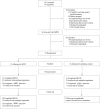Evaluating the Efficacy of Internet-Delivered Cognitive Behavioral Therapy Blended With Synchronous Chat Sessions to Treat Adolescent Depression: Randomized Controlled Trial
- PMID: 31682572
- PMCID: PMC6858617
- DOI: 10.2196/13393
Evaluating the Efficacy of Internet-Delivered Cognitive Behavioral Therapy Blended With Synchronous Chat Sessions to Treat Adolescent Depression: Randomized Controlled Trial
Abstract
Background: Depression is a common and serious problem among adolescents, but few seek or have access to therapy. Internet-delivered cognitive behavioral therapies (ICBTs), developed to increase treatment access, show promise in reducing depression. The inclusion of coach support in treatment is desired and may be needed.
Objective: The aim of this study was to determine the efficacy of an ICBT protocol blended with weekly real-time therapist sessions via chat; blended treatment, for adolescent depression, including major depressive episode (MDE). The protocol has previously been evaluated in a controlled study.
Methods: In a two-arm randomized controlled trial, adolescents 15 to 19 years of age were recruited through a community setting at the national level in Sweden (n=70) and allocated to either 8 weeks of treatment or to minimal attention control. Depression was assessed at baseline, at posttreatment, and at 12 months following treatment (in the intervention group). The primary outcome was self-reported depression level as measured with the Beck Depression Inventory II at posttreatment. The intervention was offered without the need for parental consent.
Results: Over two weeks, 162 adolescents registered and completed the baseline screening. Eligible participants (n=70) were on average 17.5 years of age (SD 1.15), female (96%, 67/70), suffered from MDE (76%, 53/70), had no previous treatment experience (64%, 45/70), and reported guardian(s) to be aware about their depression state (71%, 50/70). The average intervention completion was 74% (11.8 of 16 modules and sessions). Following the treatment, ICBT participants demonstrated a significant decrease in depression symptoms compared with controls (P<.001), corresponding to a large between-group effect (intention-to-treat analysis: d=0.86, 95% CI 0.37-1.35; of completer analysis: d=0.99, 95% CI 0.48-1.51). A significant between-group effect was observed in the secondary depression outcome (P=.003); clinically significant improvement was found in 46% (16/35) of ICBT participants compared with 11% (4/35) in the control group (P=.001).
Conclusions: The results are in line with our previous study, further demonstrating that adolescents with depression can successfully be engaged in and experience significant improvement following ICBT blended with therapist chat sessions. Findings on participants' age and baseline depression severity are of interest in relation to used study methods.
Trial registration: ClinicalTrials.gov NCT02363205; https://clinicaltrials.gov/ct2/show/NCT02363205.
Keywords: adolescent; cognitive behavioral therapy; depression; digital health; instant messaging; internet; mental health; randomized controlled trial; technology; text messaging.
©Naira Topooco, Sandra Byléhn, Ellen Dahlström Nysäter, Jenny Holmlund, Johanna Lindegaard, Sanna Johansson, Linnea Åberg, Lise Bergman Nordgren, Maria Zetterqvist, Gerhard Andersson. Originally published in the Journal of Medical Internet Research (http://www.jmir.org), 01.11.2019.
Conflict of interest statement
Conflicts of Interest: None declared.
Figures


References
-
- Thapar A, Collishaw S, Pine DS, Thapar AK. Depression in adolescence. Lancet. 2012 Mar 17;379(9820):1056–67. doi: 10.1016/S0140-6736(11)60871-4. http://europepmc.org/abstract/MED/22305766 S0140-6736(11)60871-4 - DOI - PMC - PubMed
-
- Kessler RC. The costs of depression. Psychiatr Clin North Am. 2012 Mar;35(1):1–14. doi: 10.1016/j.psc.2011.11.005. http://europepmc.org/abstract/MED/22370487 S0193-953X(11)00113-4 - DOI - PMC - PubMed

